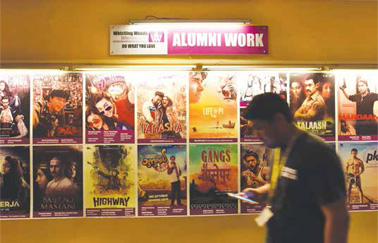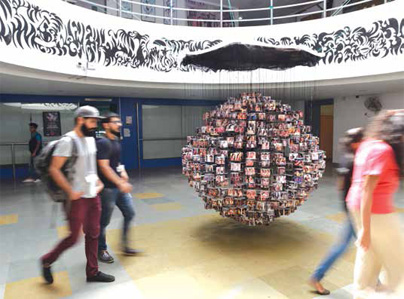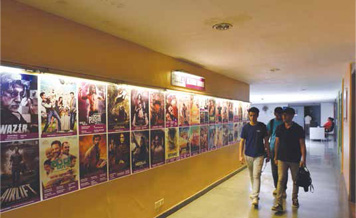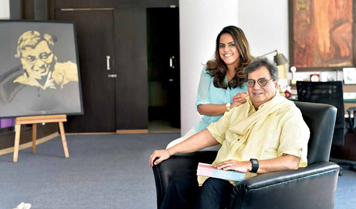Whistling Woods International (WWI) is a Film School set in the premises of the iconic Film City of Mumbai, spread over several hundred acres of land. A private educational institution, it has recently tied up with the Tata Institute of Social Studies (TISS) for its degree and diploma in films. The founder is the stalwart film personality Subhash Ghai, who has made many super hit Bollywood movies. While Whistling Woods is his creation, his daughter, the smart and savvy Meghna Ghai Puri is its President. She speaks at length with Corporate Citizen on the concept and philosophy of Whistling Woods, which is considered as one of the top five film institutes of the country. Excerpts from the interview…

My father had no background of motion movies when he decided to join the film industry. He was a B.Com. Graduate. His father was a dentist and his mother, a teacher. After he arrived in Mumbai from North India, he decided to enter the film industry, because he was very creative when he was in school and college. His father advised him to join an institute before joining the industry and that’s how he joined the Film and Television Institute of India (FTII) in Pune. Having no godfather to back him and give him a break in the industry, he had to go through a very long and hard struggle. He had come to Mumbai to become an actor—which he did—but ended up writing scripts for films, to make a living. Then, of course, opportunities poured in and rest is history. During his struggling days, he promised to himself that even if he makes it big, he will build a small library or a school in Mumbai, so that those who have no godfather will have a platform to get into the industry.
Of course, you have to have a hidden talent—a lot of people don’t go to any school and still make it big. So, it is not that you can’t make it without going to a film school. But a film school gives you a certain foundation, bonding and the best thing that it offers is a platform for networking—that was his dream. He would say, “I want to build something here so that those who don’t come from the film industry also get an opportunity to make it big.”
Once he started working towards it, he began comprehending the academic venture. He was trying to understand the creativity part of it and realised that there are so many things that are lacking in the talent that is here.
For example, when we had launched IPO of Mukta Arts in 2000, we were to make eight films a year—but where was the talent to make those films, to write those films, to produce those films? He realised that there was a dearth of talent and he had to build something where talent could be developed to international standards. He asked his investors to allocate funds to his dream project of starting a film institute. Of course, we had to put in a lot more investment. When he starts dreaming, it is never a small dream—it just becomes bigger and larger than life. That’s why you can see this beautiful and sprawling WWI campus. We started with 80 students and now we have over a 1000 of them.
My involvement really started when I finished the course in communication and marketing in London. He asked me to immediately come back saying, “It is really important for my dream and you are spearheading it. I need you to be there at the forefront.” Initially I was a bit worried because I did not know what was going to happen. However, I came back and joined him, but I found there was nothing here—there was no building, the land was just barren and surrounded by a jungle.

There was the legacy of FTII but it had its limitations as far as employability was concerned. We wanted to make sure that our students are employable. For some of the technical courses, students would be picked up immediately, but a lot of creative students would not be able to excel in Bollywood or the Hindi mainstream cinema. Ours being a mainstream school, we needed to make sure that our curriculum had that balance. So we did a lot of research on this and also went to film institutes in the US, Australia, Europe, to understand their curriculum. We were also tempted to just pick up their curriculum and bring it here the way it was, but at that point we realised that our students were very different from the students there.
Today, things might be different because of exposure to technology, but back then our students did not get exposure to any digital media or art—it was, at best, a hobby kind of course. We had to customise the curriculum to our students and to our industry. So we took all our knowledge from other schools and we came up with our own curriculum, which we change as per requirement. Being a private and dynamic institution, we keep revising it every six months because the industry is changing so fast. We have many technology partners who are on board, who keep telling us what is the future rather than what is the present and what is the past. So our curriculum changes accordingly.
A lot of people think that since the fees are high, only the rich would be coming here. That is not true. Over 70 percent of our students come with bank loans—usually personal bank loans because our fees are high and education loan is not enough. They put a lot of things at stake and come here to study. They are very responsible students.
Then we have students who come here after leaving their engineering or are studying engineering. And there are medical students, actually doctors who come and study acting and direction. We had a student who had worked in Microsoft in New York. So we have all sorts of students who come here, age no bar. Only 50 percent or even less are students from Maharashtra. We also have about 15 percent foreign students who come and study here.
We have different schools—we have a school of films, school of animation, school of media and communication and school of acting and music. Films being most expensive, the average fees come to Rs.14–15 lakhs for a three year programme, whereas an MBA or BBA costs around Rs. 6–8 lakhs. It depends on what course you are doing. In the film course, we need a lot of equipment. We make around eight films with the students. We easily spend that money on making those films. If they were to make those films themselves, they would never be able to make it with that budget. So, we have to give them the value for what they are paying—what they get in value may be three–four times more than what they pay as fees.
Technology has become highly advanced, which is a good thing because it has also become easier to operate. Students are also so advanced in their learning that they grasp it very fast. So, less time is taken to teach them technology and its usage. They are so techno-savvy that they make music albums and edit on the phone. So I don’t think technology is a barrier at all. It is actually an advantage because your music video or film can be made in an economical manner. A lot of students make short films themselves, just using a camera and a laptop—expressing themselves in a much easier way. If you were to make a film the conventional way, imagine how much work you would have to do.

We have to be ahead. An institute like the FTII is government funded—they may have certain technology but they don’t have operators to use it. We have tied up with technology partners— they are on the campus. We have got Foxconn to open their media labs here—they are responsible for our media lab completely. We also have YouTube on campus. We have AMD, which takes care of any hardware and software that is related to animation. We also provide the facility of VHS (Video Home system). So, what happens when such stalwart companies come on board? They understand the value—these 800 students are learning at WWI and will be able to use their product better when they get out and become the influencer. I have had students recommending a particular Sony camera to the director of the film, assuring him about its quality. Because that student was so confident, the director agreed to use that camera. So, Sony is very happy because our students are becoming its brand ambassadors. The same is the case with other companies. So we tied up with all these technology partners so that we can give our students the best and the students become their ambassadors.
A lot of people don’t go to any school and still make it big. So, it is not that you can’t make it without going to a film school. But a film school gives you a certain foundation, bonding and the best thing that it offers is a platform for networking
Some of them do. We have an on-campus Sony centre, which is one of only three such centres in the world, the other two are in London and Los Angeles. YouTube, for example, has spaces all over the world. They encourage a lot of filmmakers to make better quality short films and also monetise them. A lot of kids these days have their own channels and they make their own videos but they don’t know how to make money out of them. So YouTube is here to guide them. Again the YouTube space in our premises in Mumbai is the only one in India and the second in Asia after Japan.
A lot of friends in the industry have been very kind to us and very helpful. They come and do sessions with our students and also help us in building the curriculum. We also have faculty which comprise working professionals from the film industry. They are actively working in the industry but also come here to teach. Of course, you can’t expect a Shahrukh Khan to come and teach every day, but when we need them, they are there for us.
First of all, in this industry, placement does not happen like it does in a regular industry. We have placement where a few corporate companies like Star and Zee come to our campus to hire, whereas in production companies, the placements happen, project wise. When these production companies are shooting for a film, they look for talent then. Luckily for us, because all noted people from the film industry are on our advisory board, they keep hiring from Whistling Woods. They call us up and tell us about their requirement and then we pick students who fit the criteria. As of now, we have 1,500 students placed in the film industry. They all look after each other. They all collaborate, make sure they are making each other’s films. In our School of Media Communication and in the School of Fashion, yes, we have placements in the conventional manner. We get these corporates here; the designers interview students and hire. In fashion, we do a little differently. We get them in for internship and then they go ahead and choose.
Subhash Ghai, stalwart film maker, Founder and Chairman of Whistling Woods International, believes in the right kind of education rather than right to education. He speaks about why he decided to start his film academy
“I did go through the set format of schooling but I was always disturbed with the syllabus as I could not understand how they could enforce on my mind information that I was not ready for, or interested in.

“What I was interested in knowing as a child was about the society and culture that we live in. I could not identify with the international sensibility and culture imposed upon me through text books. Fortunately, my mother narrated to me the entire epic of Ramayana and Mahabharata when I was in Std III so by Std IV, I knew both epics thoroughly as I could comprehend them due to the familiarity of the characters, cities, culture and environment that I lived in and saw around me.
“I wanted to educate myself with my own observation. I used to contemplate and introspect about many things - Why this religion? Why these idols? Why these traditions? Why do we celebrate Diwali? What does Gayatri mantra mean? What is the difference between a financially rich and a mentally rich person? However, I could not get any answer from the outside. So, I educated myself by connecting to art because through art - be it in the form of drama, music or poetry, I could understand better.
“I used to write, act and direct plays during my school and college days. I wanted to be in a different horizon and fortunately my College Principal told my father not to make me a chartered accountant, but that I would flourish in the medium of art. So, my father advised me to go to FTII for formal training. After that, I came to Mumbai, became an actor, then writer, producer and finally I am an educationist because my whole experience was not only making films but I was learning from every department.
“I thought this was the time when I had the money, experience and knowledge so I should share it with the younger generation. I am ageing now, as I am approaching 70. When I was 60 years old, I decided to start Whistling Woods International. I visited various film schools around the world, studied them as to how they teach. Then I had my own ideas and vision. I mixed both together to make it relevant to our country. I brought in experts in the industry in an advisory role to guide us on the practical aspects of the course. l believe in the right kind of education more than right to education.
“I enjoy teaching students. I cannot say I have founded the school so I can now sit back and relax. I should be responsible for the education also. So, today, I feel my preference is more for education than for movies. I will make a film if I am excited about a particular story but I will not make films just because I am a film maker. Creating this institute is equal to making 25 films for me. I am creating film makers which is giving me immense happiness. I will always do what gives me happiness. I believe in ‘do what you love, and love what you do’.
It is so difficult to say – when an undergraduate BBA student joins the industry, his monthly salary might be Rs. 25,000. If he or she is a MBA, the salary is generally Rs. 6 to 7 lakhs per annum. Students who opt for specialisation in Sound get picked up fast, as there is a dearth of such students – seven or eight opt for it. Whereas you get 25 students specialising in direction. And these are the areas where you need a lot of luck to get the right break at the right time. It involves assisting a veteran film director first, then getting your first break.
Yes, yes! That is the crux of our course. We train our kids to be entrepreneurs because a lot of independent projects happen these days. So they need to understand how to manage a team, manage finances and their own studios.
The Music School is a new concept. We started a diploma course in music last year. We started with seven students and now we have 30. We began with a diploma course. Now we have moved on to offering a degree course. We have Sangita Shankar, noted violinist, heading it. She is a Grammy award nominee. We have Subhashji himself, sitting in the class and guiding students.
Our concern is music composition. So we teach them everything. We teach them instruments and vocal. But the main objective is, that they should be able to compose music.
In terms of his transition from a film maker to a teacher, you have to have that passion to teach and I have seen him doing that since he was a filmmaker. He always had taught people around him. Not every director does it. Some directors just like to be left alone; they work and they just instruct their assistants. My dad loves an audience. He loves to talk to them and engage with them. So since he has always been a teacher even as a filmmaker, this is just a natural transition. Even he enlightens students with what he learnt as a student, through his long experience.
Our association with TISS has been very unique. It started because TISS has been assigned a role in skill development by the HRD ministry. They were supposed to have verticals for skills and start doing skill development programmes all over the country. The verticals we had here are in media and entertainment. So we developed a programme for them. When we did that, they saw how well we work, how professional it was and then we asked them can we actually offer a TISS degree? The director was very dynamic, very forward thinking. He said, ‘Yes, why not.’ And that is how the association began in 2014.

Shashank Khaitan is a filmmaker who is working with Dharma. He has made the successful film Humpty Sharma Ki Dulhania and he is working on his second film, Badrinath ki Dulhaniya. We have lots of actors who are doing really well. They are doing character roles but they have carved a niche for themselves. Anil Mange and Rajashri Deshpande are also doing really well. They are acting in big films in very important roles.
It is a tougher generation we are dealing with because they have the power of technology in their own hands. The change has happened over the last few years and they are in the middle of it. So I think we should be sympathetic and empathetic towards that. Yes they are a bit distracted but maturity comes with age. Our focus with them is to not just make them good in academics because when they graduate, they should be mature kids who can impress the outside world. Learning will happen. How can you teach film making in three years? They have to go and work after that.
They are talented. I feel that the quality of kids will be better now because parents are not holding their kids back. Earlier the problem was that parents were not allowing the kids to study films because they would think, what’s the backup plan, what if you don’t make it in films? Now with this degree of a good brand, they are happy saying, ‘Okay. Let him do this for three years.’ – they are open to giving them a chance. So we are getting better and better students to join us.
The philosophy of Whistling Woods is really to do what you love. We have been inspired by Steve Jobs. Every student here is asked to do what he or she loves and we encourage parents also to let them do that. If your child wants to do something, don’t pull him/her back because at the age of 30- 40 he/she may regret that they couldn’t try it out. My personal philosophy for life is – once you make a determination in your life to be positive, everything falls in place. The day you decide nothing is going to work out, things start falling apart. So for me, be positive and have determination in life to become courageous and to make sure that my life is going to go in a certain way and I will make it happen.
We have an on-campus Sony centre, which is one of only three such centres in the world - the other two are in London and Los Angeles. YouTube encourages a lot of our students to make better quality short films and also monetise them

I feel it is very important; every school must have it. My childrens’ school also has a school counsellor. Youngsters go through all kinds of turmoil, especially at this age. And I think it is nice for them to have somebody to talk to, better than sending them to some shrink or thinking they are nuts. Sometimes they are not able to talk to their peers or teachers. The teacher may not qualify to counsel. You need to have psychiatric training to understand what the child must be going through. Nowadays every second person has depression. So we don’t want them to reach that situation. They should come, talk and share so they don’t go to that stage.
Our lives when we were younger were much simpler. We knew that we had to just listen to our parents, that whatever they said was right and technology was not around to mess up with our minds. However, every generation, because of the changes, goes through these phases. So now it has just become more advanced and now we are also having the culture of counsellors. So why not have that? Other than counselling, we also have a meditation room on campus. Spiritual engagement is an important part of growing up, so we make sure that they connect spiritually so that tomorrow if there is stress in life, they would be able to ably handle it.
I don’t! That’s difficult. You never find the right balance. I think for women it is quite important to understand that you are not going to be able to achieve everything. You have to prioritise. You have to make sure that you are there for your kids when they need you, but then work has also got to be done. My kids have seen me work since they were born. They were coming with me when they were two-three months old. I used to bring them here and keep them at the crèche. They have seen this life. I don’t think they get hassled if they are at home. They see a mother who is independent, who is working. I believe very strongly that for girls and boys, it is important that the mother is independent. Sometimes I also feel I should take a break. But I don’t want to do that for the sake of my kids. They should see me as a role model, doing so many things.
By Vinita Deshmukh